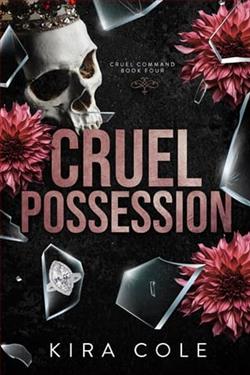Page 92 of Forced to Marry the Russian Pakhan
I barely hear him. All I can see is Trifon, unconscious, blood pooling beneath him. His face is ashen, lips tinged blue. The wound is still pumping blood with each heartbeat.
Oh God. Oh God. Oh God.
The world tilts and narrows, fear crushing my chest like a vise. I can’t lose him. The thought hits me with such force that I nearly stagger.
I can’t lose him.
My hands shake so badly I can barely feel for a pulse.
“Is he...” Leonid doesn’t finish the question.
“He’s alive,” I say, finding the weak, thready beat at his neck. “But he’s lost a lot of blood.”
I need to focus. I need to be a doctor right now, not a terrified woman. I force air into my lungs, willing my training to take over.
“Marina,” I call to my nurse. “Get me the trauma kit. IV fluids, wide open. And blood—O negative, two units.”
The room erupts into controlled chaos. Marina moves as fast as she can for her Pakhan, hooking up monitors that immediately scream alarms at Trifon’s dangerously low blood pressure. The bullet wound is still bleeding freely, too close to an artery.
I press gauze against it, leaning my full weight to stem the flow. “I need light. More light!”
Someone—I don’t even register who—angles the surgical lamp closer. The bullet is still in there. I can feel it, metal against bone, when I probe the wound.
“I need to get the bullet out now,” I say, more to myself than anyone else. “If it shifts, it could nick the artery.”
Marina hands me forceps, a scalpel, and retractors. My hands are steady now, the doctor in me taking over. The woman who loves him—because yes, I love him, I realize with sudden clarity—has to step aside so the doctor can save him.
I cut, probe, and widen the wound enough to see the path of destruction the bullet carved through muscle and tissue. Every time I touch the metal fragment, Trifon’s body jerks slightly. Even unconscious, he feels pain.
“I’m sorry,” I whisper, continuing to work. “I’m so sorry.”
Blood wells up, obscuring my view. Marina suctions it away, her face as nervous as mine must be. The bullet has fragmented, making extraction more difficult. I carefully remove each piece, dropping them into a metal basin with tiny clinks that sound too loud in the tense room.
“BP’s dropping,” Marina warns.
“Hang another unit,” I order, not looking up from my work. “Push more fluids.”
Minutes stretch into what feels like hours as I dig deeper, finding the main fragment lodged against his scapula. If it had been half an inch to the left, it would have severed his artery. He would have bled out before they got him here.
The thought makes me work faster, more urgently.
“Got it,” I finally say, extracting the largest piece. It comes free with a sick, wet sound.
I clean the wound of debris, irrigate it with an antiseptic solution, and place sutures. My fingers move automatically, muscle memory from years of training taking over. But my heart—my heart is screaming with every beat.
Don’t die. Don’t leave me. Please.
I don’t know when I realize I’m crying.
Not loud, not shaking—just quiet tears streaming down my cheeks as I finish closing the wound. I feel Nina squeeze my shoulder once, brief and firm, before she steps away to update the others.
It’s over. He’s stable.
By the time I’m done, my scrubs are soaked with Trifon’s blood. Color is returning to his face, though he remains unconscious.
“He’s lucky,” I announce, stripping off my gloves. “The bullet missed the major vessels.”
Leonid exhales loudly.















